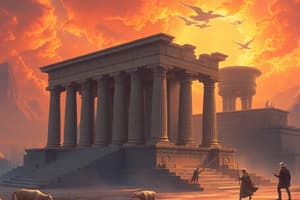Podcast
Questions and Answers
What were the time periods during which Classical Civilizations flourished?
What were the time periods during which Classical Civilizations flourished?
Between 800 BCE and 600 CE.
Name one key civilization from the Indian subcontinent and its notable contributions.
Name one key civilization from the Indian subcontinent and its notable contributions.
The Gupta Empire, known for advancements in mathematics and science.
What was one characteristic of Classical Civilizations related to urban development?
What was one characteristic of Classical Civilizations related to urban development?
Urbanization, which included the development of large cities.
How did trade networks impact Classical Civilizations?
How did trade networks impact Classical Civilizations?
Explain the significance of the military power of Classical Civilizations.
Explain the significance of the military power of Classical Civilizations.
What legacy did Greek and Roman ideas leave for modern Western Civilization?
What legacy did Greek and Roman ideas leave for modern Western Civilization?
What role did writing systems play in Classical Civilizations?
What role did writing systems play in Classical Civilizations?
How can students effectively study Classical Civilizations?
How can students effectively study Classical Civilizations?
Flashcards
Classical Civilizations timeline
Classical Civilizations timeline
Civilizations that flourished between 800 BCE and 600 CE, spread across Europe, India, and the Americas.
Key European/Near East examples
Key European/Near East examples
Greek city-states and the Roman Republic/Empire are examples from this area.
Indian Subcontinent example
Indian Subcontinent example
The Gupta Empire was a significant civilization in the Indian Subcontinent.
Americas Classical Civilizations
Americas Classical Civilizations
Signup and view all the flashcards
Urbanization in Classical Civilizations
Urbanization in Classical Civilizations
Signup and view all the flashcards
Classical Civilization Government
Classical Civilization Government
Signup and view all the flashcards
Cultural achievements
Cultural achievements
Signup and view all the flashcards
Writing systems and Classical Civilizations
Writing systems and Classical Civilizations
Signup and view all the flashcards
Study Notes
Classical Civilizations
- Classical Civilizations flourished between 800 BCE and 600 CE.
- They spanned across Europe, the Indian subcontinent, and the Americas.
- These civilizations included city-states, republics, empires, and kingdoms.
Key Examples of Classical Civilizations
- Europe and Near East: Greek city-states, Roman Republic and Empire
- Indian Subcontinent: Gupta Empire
- Americas: Mayan and Aztec Civilizations
Characteristics of Classical Civilizations
- Urbanization: Development of large cities.
- Sophisticated Governments: Organized governments with laws, institutions, and administration.
- Advanced Technologies: Development of new tools, techniques, and innovations.
- Trade and Commerce: Extensive trade networks and economic activity.
- Cultural Achievements: Significant achievements in art, literature, philosophy, and science.
Key Influences
- Development of Writing Systems: Facilitated communication and knowledge spread.
- Advances in Agriculture: Increased food production and population growth.
- Trade Networks: Promoted economic growth and cultural exchange.
- Military Power: Expansion of territories and influence.
Significance of Classical Civilizations
- Foundation of Western Civilization: Greek and Roman ideas influenced philosophy, law, architecture, and literature.
- Development of Important Concepts: Political structures, democracy, and citizenship originated.
- Cultural Heritage: Enduring legacy in art, literature, science, and philosophy.
Studying Classical Civilizations
- Use online and library resources.
- Examine maps, primary sources, and secondary sources.
- Analyze causes and consequences of major events and trends.
- Compare and contrast different civilizations.
Online Resources
- YouTube Channel: Provides videos on classical civilizations.
- Website: Encourages subscriptions to the channel.
- Social Media: Encourages sharing and liking of videos.
Studying That Suits You
Use AI to generate personalized quizzes and flashcards to suit your learning preferences.




